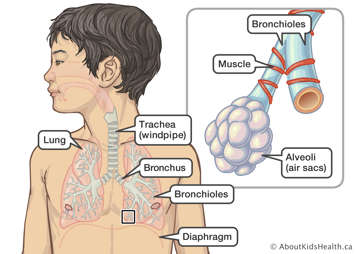What is a viral respiratory infection?
Viral respiratory infections include colds, the flu, bronchiolitis and some types of lung infections (e.g., pneumonia).
Respiratory means something that affects the lungs and airways (breathing passages). Viral respiratory infections may cause coughing, sneezing, runny noses, sore throats or fever.
Viral means something that is caused by a virus. Viruses that cause viral respiratory infections include respiratory syncytial viruses (RSV), influenza viruses, enteroviruses, parainfluenza viruses, adenoviruses, coronaviruses and rhinoviruses.
Viral respiratory infections are not caused by any of the following things, although the symptoms may be similar:
- bacteria, such as group A Streptococcus (strep) or pertussis
- medicines
- other medical conditions such as allergies or asthma

Symptoms of a viral respiratory infection
A person with a viral respiratory infection may have the following symptoms:
- coughing
- sneezing
- runny nose
- sore throat
- fever
- trouble breathing
The person may also have a headache or sore muscles, or they may feel very tired.
In general, the symptoms start one to two days after the person catches the virus. They may last for one to 10 days, depending on which virus is causing the illness.
Anyone can get a viral respiratory infection
People of all ages and backgrounds can get a viral respiratory infection.
A viral respiratory infection can be a serious illness for some people
For most people, a viral respiratory infection is not a serious illness. People who get a viral respiratory infection almost always get completely well. They do not have any long-term problems.
For some people, though, a viral respiratory infection can be a serious illness. People who are more at risk from a viral respiratory infection include the following:
- babies
- young children
- people with an immune system problem or a chronic illness
- people who cannot care for themselves well, such as the disabled or elderly
These people may develop more serious complications, such as pneumonia or dehydration. They may get more severe symptoms than healthy people. People with severe symptoms may need to stay in the hospital for treatment to help with their breathing.
How a viral respiratory infection is spread
Most viral respiratory infections are spread by touching:
- mucus from the nose or mouth of a person who has the virus
- soiled tissues or surfaces a person with the virus has touched
- the unwashed hands of a person with the virus
Treating a viral respiratory infection
To treat a viral respiratory infection in children and adults:
- Make sure the person gets plenty of rest.
- If a baby has congestion in the nose, consider using a saline nasal wash and an aspirator to suck the mucus out of their nose. These products are available over-the-counter and may help your baby breathe more easily while they sleep.
- Give the person lots of clear fluids to drink, such as water and apple juice. This will help make sure they do not get dehydrated.
A health-care provider may prescribe medicine to help the infected person breathe more easily. The health-care provider will probably not prescribe antibiotics. Because viral respiratory infections are caused by viruses, antibiotics will not help treat the virus.
If your child has a viral respiratory infection in the hospital
Your child may be placed in a single room and will not be able to leave the room until they are feeling better.
Hospital staff will be wearing a mask, eye protection, gloves and a gown when they visit. Always wash your hands before and after touching your child and before leaving your child's room. Hospital staff should wash their hands as well.
If you or anyone else who has visited becomes ill with symptoms of a viral respiratory infection, let your child's health-care team know.
Viral respiratory infections can be prevented with good hygiene and sometimes immunizations
Good handwashing can help people from catching or spreading a viral respiratory infection. This is very important in hospitals, but it is true in other places as well.
To avoid spreading a viral respiratory infection, you should also do the following things:
- Always cover your mouth and nose with a tissue when you cough or sneeze. Throw away the tissue. Then wash your hands.
- Do not visit the hospital when you are ill with symptoms of a viral respiratory infection. Ask other family members and friends to do the same.
- Wearing a mask when you are ill or when you are in contact with someone who is ill can help prevent spreading the virus.
Some viruses that cause respiratory infections, such as RSV, influenza and COVID-19 can be prevented with immunizations. Speak to your health-care provider to see if your child is eligible for any of these specific immunizations.
